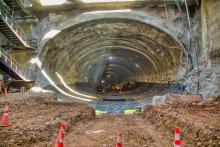The concession package for the US$1.06 billion Américo Vespucio Oriente (AVO) expressway in Santiago, Chile looks set to be awarded to a consortium headed by OHL Concesiones Chile. OHL's proposal of a subsidy close to 20% of the project's cost beat Spanish group Cintra's bid, according to a report from Business News Americas. Of 15 companies that prequalified for the project, only OHL in an alliance with Sacyr Concesiones Chile and Cintra had submitted technical offers for the 40-year concession. Constructi
The concession package for the US$1.06 billion Américo Vespucio Oriente (AVO) expressway in Santiago, Chile looks set to be awarded to a consortium headed by 980 OHL Concesiones Chile. OHL's proposal of a subsidy close to 20% of the project's cost beat Spanish group 930 Cintra's bid, according to a report from Business News Americas. Of 15 companies that prequalified for the project, only OHL in an alliance with 3959 Sacyr Concesiones Chile and Cintra had submitted technical offers for the 40-year concession. Construction will begin in 2015, after the approval of environmental impact studies and detailed engineering plans. The tender was split in two, given the complexity of the project, which will run through five municipalities in eastern Santiago. The Plan entails building and operating a 9.3km underground expressway running from El Salto Avenue to Príncipe de Gales avenue under the current Américo Vespucio route. The missing link in the city's beltway was originally intended to run underground for 13km, joining El Salto with Grecia Avenue. However, opposition from residents in La Reina and Peñalolén districts as well as concerns over the high cost of this option persuaded the 968 Chilean Government to split the project and call a tender only for the first 9.3km stretch. Vespucio Oriente will be built on two levels, each one hosting a one-way, three-lane expressway. Road capacity will increase to 8,000 vehicles/hour from the current 3,000/hour in a bid to tackle the city’s chronic congestion. The project has been delayed several times and the Chilean Government is reviewing options for the construction of the remaining 4km.





